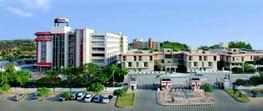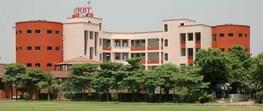Dr. Meghna Sharma is a faculty of the School Of Engineering at The NorthCap University. As per her academic qualifications, she holds a Ph.D. in Data Science domain from YMCA Faridabad, an M.Tech(CSE) from GJU Hissar and a B.E(CSE) from DRCRUST Murthal. She has been associated with NCU since 2008. She is currently leading Data Science Specialisation in the Department of CSE and is designated as an Associate Professor.

How does the curriculum of your institute ensure the best practice of industry?
Our institute’s curriculum is designed with a strong emphasis on practicality and relevance to industry needs. We regularly collaborate with industry experts to update our programs, ensuring that our students are well-prepared to meet the evolving demands of their respective fields.
What are some of the major changes that COVID-19 has brought to the education sector according to you?
COVID-19 has had a transformative impact on education. It revolutionized the way we think about learning. Teachers also had to adapt to new pedagogical concepts and modes of delivery of teaching, for which they may not have been trained. Digital technology with easy access to the internet helped bring remote learning opportunities, online classrooms, and access to high-quality education. From conducting live lectures to uploading study material and conducting examinations, the institutions give it all for the students to learn better. It involves a paradigm shift in pedagogy through an understanding of the blended learning model by teachers, parents, and students. Virtual education has opened up possibilities of rethinking the way we have been teaching & learning.
How is your relationship with the students of your college?
I maintain a close and supportive relationship with my students. I encourage open communication, provide academic guidance, and strive to create a positive and inclusive learning environment.
Check The NorthCap University Placement
As a lead of Data Science, you must be aware that practical experience is crucial in data science. How do you ensure that your students gain practical skills and are well-prepared for the workforce?
Practical skills are indeed essential in data science. In our courses, we design assignments and projects that mimic real-world scenarios. These projects often involve working with large datasets, conducting analysis, and building predictive models. We also encourage students to collaborate and participate in data science competitions and internships. By combining classroom learning with hands-on experience, we aim to equip our students with the skills they need to excel in their careers.
In the fast-changing field of data science, how do you stay updated with the latest trends and technologies, and how do you incorporate them into your teaching?
Staying current with the latest trends and technologies in data science is crucial to providing a relevant education. We make it a priority to regularly attend conferences, workshops, and webinars related to data science. We also maintain connections with industry professionals and researchers to gain insights into emerging trends. When we identify new developments or technologies that are valuable for our students, we incorporate them into our curriculum through updates, guest lectures, or specialized elective courses.
Any suggestions/messages that you would like to give to the current youth?
To the current youth, I would like to convey the importance of lifelong learning, adaptability, and the pursuit of knowledge with passion. Embrace challenges as opportunities for growth, and always strive for excellence in whatever you do. Your education is the key to unlocking a world of possibilities.

![The Northcap University - [NCU]](https://image-static.collegedunia.com/public/college_data/images/logos/1681209235NCU2.png?h=71.7&w=71.7&mode=stretch)
.png?h=132&w=263&mode=stretch)

-min.png?h=132&w=263&mode=stretch)



.png?h=78&w=78&mode=stretch)


![BML Munjal University - [BMU]](https://image-static.collegedunia.com/public/college_data/images/appImage/1613293152Cover.jpg?h=111.44&w=263&mode=stretch)



![Dronacharya College of Engineering - [DCE]](https://image-static.collegedunia.com/public/college_data/images/appImage/16304792361493624582AppNew.jpg?h=111.44&w=263&mode=stretch)



![SGT Institute of Engineering and Technology - [SGTIET]](https://image-static.collegedunia.com/public/college_data/images/appImage/1588319625SGTcover.jpg?h=111.44&w=263&mode=stretch)

![St. Andrews Institute of Technology and Management - [SAITM]](https://image-static.collegedunia.com/public/college_data/images/appImage/56243_buil.png?h=111.44&w=263&mode=stretch)













![School of Engineering and Technology, NCU - [SOET]](https://image-static.collegedunia.com/public/college_data/images/logos/1629784818WhatsAppImage20210824at11.17.17AM.jpeg?h=72&w=72&mode=stretch)

.png?h=72&w=72&mode=stretch)



-min.png?h=72&w=72&mode=stretch)


.png?h=72&w=72&mode=stretch)
.png?h=72&w=72&mode=stretch)
.png?h=72&w=72&mode=stretch)
.png?h=72&w=72&mode=stretch)
.png?h=72&w=72&mode=stretch)

![Pandit L.R. College of Technology - [PLRCT]](https://image-static.collegedunia.com/public/college_data/images/logos/1476269384plrctlogo.jpeg?h=72&w=72&mode=stretch)


![St. Andrews Institute of Technology and Management - [SAITM]](https://image-static.collegedunia.com/public/college_data/images/logos/1614618390Screenshot20210301222535.png?h=72&w=72&mode=stretch)
![Manav Rachna University - [MRU]](https://image-static.collegedunia.com/public/college_data/images/logos/1547191036manavrachnalogo.png?h=72&w=72&mode=stretch)




![BML Munjal University - [BMU]](https://image-static.collegedunia.com/public/college_data/images/logos/1613540630Screenshot20210217111200.png?h=72&w=72&mode=stretch)


![GD Goenka University - [GDGU]](https://image-static.collegedunia.com/public/college_data/images/logos/1759226836L1.png?h=72&w=72&mode=stretch)


Comments